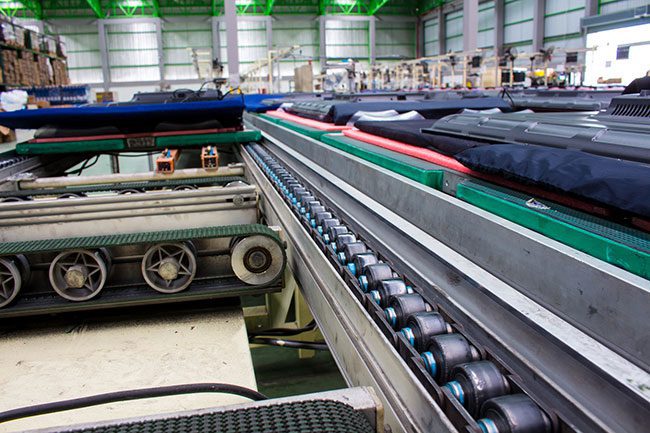Fabricating Conveyor Belts

Conveyor belts can move products down a straight line or take products over, under, and around obstacles within a facility. They can support products from underneath or attach to products from above for hanging purposes. Conveyor belts and the pulley systems that run them can only work as well as their individual parts. The fabrication process determines the capabilities, durability, and performance of the entire system.
Popular Conveyor Belt Materials and Their Uses
Manufacturers commonly specialize in certain types of belt materials. The most common materials include fabric such as nylon or polyester, rubber, metal, and thermoplastics. The material and its structure largely determine the case uses for the conveyor system.
Grocery stores, consumer goods packaging facilities, and shipping centers may use a polyester or other fabric belt for flexibility and ease-of-use. Food-handling operations must use food-grade material belts such as thermoplastics and metals for cooking, drying, processing, and packaging.
In the mining and extraction industries, companies must use heavy-duty rubber and metals to convey raw materials without damaging the belt.
Agricultural businesses commonly use rubber belts with cleats or trough shaping to easily transfer bulk goods vertically into a storage bin or silo. The pharmaceutical industry often relies on thermoplastic and metal conveyor belt systems to comply with sterility requirements in lab and production settings. Chemical manufacturers and processing plants must choose a material that can withstand corrosives, high temperatures, and other hazardous conditions. Certain metals and metal coatings, thermoplastics, and rubber materials work well in chemical-related applications.
Metal conveyor belts are versatile, durable, and cost-effective. They can take on a number of shapes to accommodate the use case. Some sheet metal belts feature minuscule perforations for a vacuum hold on lightweight and delicate items. Woven, hinged, and custom belts can process small electronics components, foods, and production line parts of all kinds. Roller conveyors allow packages and products to slide effortlessly along a continuous line of rolling cylinders.
Stainless steel and aluminum conveyor belts and their pulley systems can take on a variety of coatings such as Teflon or neoprene (a type of rubber) to better suit application needs for less or more friction. Many companies order custom metal fabrications to meet the unique specifications of a work environment.
Making Conveyor Belts
Every manufacturer uses a different process to craft conveyor belts that fit project needs. Thermoplastic manufacturers, for example, may use injection molds or extrusion to create modular belt components and then assemble the belt on a pre-manufactured pulley system. Many thermoplastic, rubber, and fabric belts feature both an inner core and an outer cover for strength. The belt fabrication process involves manufacturing the rubber, plastic, or metal core before covering it in a fabric, plastic, or rubber surface.
Metal fabricators can handle metal-conveyor fabrication as an end-to-end process and rarely need to create layers of materials to use on the conveyor system. They can craft the conveyor chain or belt as well as the pulley system components to ensure each part works together seamlessly. Processes commonly used in the metal fabrication for woven, sheet, and chain conveyors with pulley systems include large- and small-scale rolling and forming, CNC machining, welding, and other processes to shape and fit conveyor system components.
Finding Conveyor Belt System Fabricators
The conveyor belt manufacturing can take place as part of a pre-fab conveyor system process or as a custom-fabricated order. A custom fabrication often provides increased value for the customer, because the finished product will easily fit facility specifications, and the level of quality available through custom work can enhance performance and productivity over time.

Swanton Welding offers a full menu of services for custom conveyor belt fabrication work. We can craft metal belts and pulley systems to meet your needs in any industry or application. Contact our team today at (419) 826-4816 for more information.
